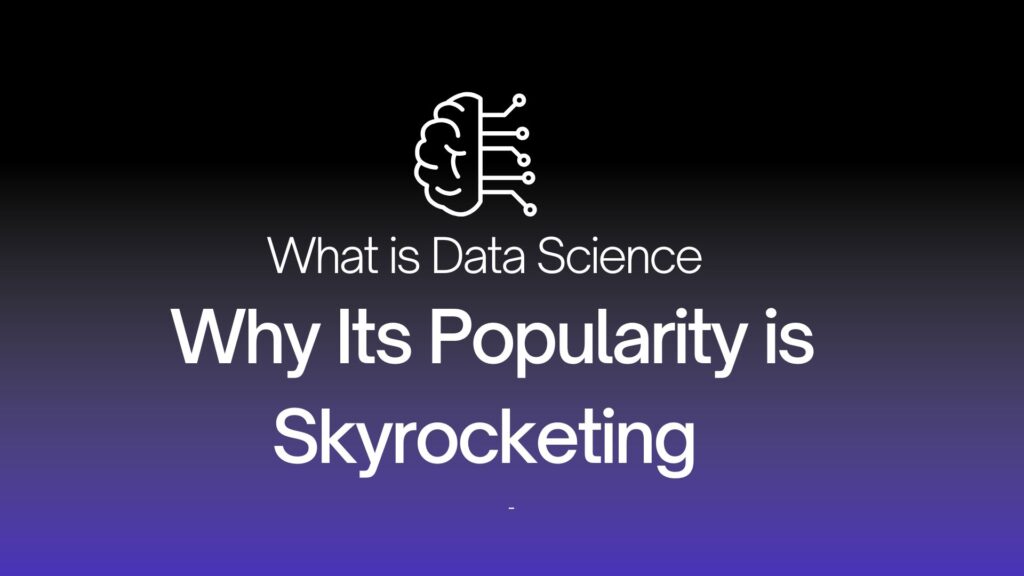In today’s digital-first world, data has become the new oil. Every click, swipe, purchase, and interaction generates valuable information that organizations are eager to harness. This surge in data availability has catapulted data science from a niche academic field to one of the most sought-after career paths of the 21st century.
Understanding Data Science – More Than Just Numbers
Data science is an interdisciplinary field that combines statistical analysis, programming, domain expertise, and machine learning to extract meaningful insights from structured and unstructured data. Unlike traditional statistics, data science encompasses the entire data lifecycle—from collection and cleaning to analysis, visualization, and actionable recommendations.
At its core, data science answers critical business questions: What happened? Why did it happen? What will happen next? And most importantly, what should we do about it? This multifaceted approach makes data scientists invaluable across industries, from healthcare and finance to entertainment and retail.
The field draws from multiple disciplines including mathematics, statistics, computer science, and domain-specific knowledge. A data scientist might use Python or R for analysis, SQL for database queries, and tools like Tableau or matplotlib for visualization, all while applying statistical methods and machine learning algorithms to solve real-world problems.
The Perfect Storm – Why Data Science is Exploding in 2021
Several converging factors have created unprecedented demand for data science professionals, making it one of the fastest-growing fields in the job market.
The Data Explosion
We’re generating data at an unprecedented rate. According to IBM, we create 2.5 quintillion bytes of data daily, with 90% of the world’s data created in just the last two years (IBM, 2020). This explosion stems from our increasingly digital lives, IoT devices, social media platforms, and the recent acceleration of digital transformation due to COVID-19.
Digital Transformation Acceleration
The pandemic has forced organizations to rapidly digitize their operations. Companies that previously relied on traditional business models have pivoted to data-driven approaches almost overnight. This shift has created massive demand for professionals who can make sense of digital data streams and guide strategic decisions.
Proven ROI and Competitive Advantage
Organizations are witnessing tangible returns on their data science investments. Companies using data-driven decision making are 23 times more likely to acquire customers and 19 times more likely to be profitable, according to McKinsey Global Institute research (McKinsey, 2020). This proven value proposition is driving executive buy-in and budget allocation for data science initiatives.
Technological Accessibility
Cloud computing platforms like AWS, Google Cloud, and Microsoft Azure have democratized access to powerful computing resources. Tools that once required expensive hardware investments are now available on-demand. Additionally, open-source languages like Python and R, combined with libraries such as scikit-learn, TensorFlow, and pandas, have lowered the barrier to entry for aspiring data scientists.
AI and Machine Learning Mainstream Adoption
Artificial intelligence and machine learning are no longer confined to tech giants. Businesses of all sizes are implementing recommendation systems, predictive analytics, and automation solutions. This mainstream adoption requires skilled professionals who can bridge the gap between complex algorithms and business applications.
Industry Applications Driving Demand
Data science applications span virtually every sector, each creating unique opportunities and challenges.
Healthcare and Life Sciences
The healthcare industry is experiencing a data science revolution. From drug discovery and clinical trials to personalized medicine and public health monitoring, data scientists are at the forefront of medical innovation. The COVID-19 pandemic has particularly highlighted the importance of epidemiological modeling and vaccine development analytics.
Financial Services
Banks and financial institutions leverage data science for fraud detection, risk assessment, algorithmic trading, and customer segmentation. The rise of fintech companies has intensified competition, making data-driven insights crucial for survival and growth.
E-commerce and Retail
Online retailers use sophisticated recommendation engines, dynamic pricing models, and supply chain optimization algorithms. Companies like Amazon and Netflix have set the standard for personalized customer experiences through data science applications.
Technology and Social Media
Tech companies remain the largest employers of data scientists, using their skills for product development, user experience optimization, content moderation, and advertising targeting. Social media platforms process billions of interactions daily, requiring advanced analytics to understand user behavior and preferences.
The Skills That Matter
The data science skill set is diverse and constantly evolving. Technical proficiency includes programming languages like Python and R, database management with SQL, and familiarity with machine learning frameworks. Statistical knowledge remains fundamental, covering everything from hypothesis testing to advanced modeling techniques.
Equally important are soft skills such as communication, business acumen, and critical thinking. Data scientists must translate complex findings into actionable insights for non-technical stakeholders, making storytelling and visualization skills essential.
Domain expertise is increasingly valuable as organizations seek specialists who understand their industry’s unique challenges and opportunities. A data scientist with healthcare knowledge brings more value to a pharmaceutical company than a generalist without domain context.
Career Prospects and Market Outlook
The job market for data science professionals remains exceptionally strong. According to the U.S. Bureau of Labor Statistics, employment for data scientists is projected to grow 31% from 2019 to 2029, much faster than the average for all occupations (BLS, 2020). This growth rate reflects not just expansion in traditional data science roles but also the emergence of specialized positions like machine learning engineers, data engineers, and AI ethics specialists.
Compensation remains highly competitive, with Glassdoor reporting an average base salary of $113,309 for data scientists in the United States as of early 2021 (Glassdoor, 2021). Senior positions and those at major tech companies command significantly higher salaries, often exceeding $200,000 annually.
The career progression paths are diverse, ranging from individual contributor roles to management positions, consulting opportunities, and entrepreneurial ventures. Many data scientists eventually transition into product management, strategy roles, or start their own analytics consultancies.
Challenges and Considerations
Despite the opportunities, data science faces several challenges that aspiring professionals should understand. The field suffers from inflated expectations, with some organizations expecting immediate miraculous insights from their data. Success requires time, proper infrastructure, and realistic goal-setting.
Data quality remains a persistent challenge. Poor data quality can undermine even the most sophisticated analyses, making data cleaning and validation critical but often underappreciated aspects of the role. Additionally, ethical considerations around privacy, bias, and algorithmic fairness are becoming increasingly important as data science applications affect more aspects of daily life.
The field also faces a talent shortage, with many organizations struggling to find qualified candidates. This gap has led to the emergence of numerous educational programs, bootcamps, and online courses, though the quality and practical applicability of these programs vary significantly.
Looking Ahead
As we move through 2021 and beyond, data science will continue evolving. Automated machine learning (AutoML) tools are making certain aspects of data science more accessible to non-experts, while simultaneously creating demand for specialists who can handle complex, custom solutions.
Edge computing and real-time analytics are becoming more prevalent, requiring data scientists to work with streaming data and develop low-latency solutions. The integration of data science with software engineering practices (MLOps) is also gaining traction, emphasizing the need for production-ready, scalable solutions.
Privacy regulations like GDPR and CCPA are shaping how data can be collected and used, creating new challenges and opportunities for privacy-preserving analytics techniques. Data scientists will need to balance insight generation with compliance requirements.
Conclusion
Data science represents one of the most dynamic and impactful fields in today’s economy. Its popularity stems from the convergence of abundant data, technological accessibility, proven business value, and diverse application opportunities. While challenges exist, the fundamental drivers of growth remain strong, suggesting continued expansion and evolution of the field.
For those considering a career in data science, the timing has never been better. The combination of high demand, competitive compensation, intellectual challenge, and societal impact makes data science an attractive career choice. However, success requires continuous learning, adaptability, and a genuine passion for extracting insights from data to solve real-world problems.
As organizations continue to recognize data as a strategic asset, data scientists will play increasingly crucial roles in shaping business strategies, driving innovation, and creating competitive advantages. The data revolution is just beginning, and data science professionals will be at its forefront.
References
Bureau of Labor Statistics. (2020). Occupational Outlook Handbook: Mathematicians and Statisticians. U.S. Department of Labor. Retrieved from https://www.bls.gov/ooh/math/mathematicians-and-statisticians.htm
Glassdoor. (2021). Data Scientist Salaries. Retrieved from https://www.glassdoor.com/Salaries/data-scientist-salary-SRCH_KO0,14.htm
IBM. (2020). Marketing Cloud: What is Big Data Analytics? IBM Corporation. Retrieved from https://www.ibm.com/cloud/learn/big-data-analytics
McKinsey Global Institute. (2020). The Age of Analytics: Competing in a Data-Driven World. McKinsey & Company. Retrieved from https://www.mckinsey.com/business-functions/mckinsey-analytics/our-insights/the-age-of-analytics-competing-in-a-data-driven-world
World Economic Forum. (2020). The Future of Jobs Report 2020. Retrieved from https://www.weforum.org/reports/the-future-of-jobs-report-2020




